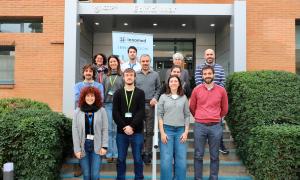The Innomed programme is launched to boost health innovation

Institutions in and around the Can Ruti Campus have come together to develop Innomed, a programme aimed at sharing skills, knowledge, and resources to boost innovation. The initiative has recently received support from the ITEMAS platform
Innomed was launched on 24 November with an initial joint meeting of the innovation units from Consorci Sanitari del Maresme (CSdM), Germans Trias Hospital (HUGTiP), Josep Carreras Leukaemia Research Institute (IJC), Institut de Recerca de la Sida (IrsiCaixa), Institut Guttmann, Institut Català d'Oncologia (ICO), and Germans Trias i Pujol Research Institute (IGTP).
The meeting served to share ideas and future visions for the initiative, as well as to celebrate the support granted by ITEMAS, a platform for supporting and transferring high-impact projects from the Instituto de Salud Carlos III (ISCIII), which will enhance innovation and build a dynamic ecosystem that will drive growth and competitiveness.
Besides the mentioned healthcare and research centres, the programme is supported by companies from different sectors: consultancy, pharmaceuticals, medical products, technology companies, venture capital... They will participate by offering training or exploring collaboration possibilities in the development of projects.
Raül Zurita, head of the Innovation and Business Development Unit at IGTP, expresses his excitement about this collaborative initiative: "Innomed is a great opportunity to share innovation knowledge and resources, enhancing the competitiveness and transfer potential of the projects from the institutions involved".
Anna Riera, head of Innovation at IJC, adds, "This type of initiative will allow a natural and necessary alliance between the research entities of the Can Ruti Campus, expanding into the Maresme area, and in close collaboration with the industry, consolidating a leading Spanish health innovation hub attractive for public and private investments".
Daniel Moreno, head of the Innovation Unit at Germans Trias Hospital, agrees: "We are part of a campus with more than 6,000 professionals dedicated to biomedicine, so there is no doubt that we have all the ingredients to make good innovation. Innomed will allow us to bring together all the institutions on the campus and better capitalise on the extensive experience of each one to build high-impact innovative projects".
Innomed: networked for health innovation
The Innomed programme is designed to promote the transfer of results, generate significant impact in the health sector, and foster the development of a robust industrial fabric at regional and national levels. "Collaboration among research centres is essential to boost competitiveness and knowledge transfer, and this is exactly what we are looking for through Innomed. This initiative will allow us to promote innovation and build a dynamic ecosystem that positions both the Can Ruti Campus and the Maresme as a reference in health innovation at national and international level", explains Cristina Val, Innovation manager at IrsiCaixa.
A key goal is the transfer of knowledge and best practices among the involved innovation units. Sharing experiences will help improve their work and create synergies. Accordingly, the programme promotes group activities and workshops, with training provided by sector experts.
The programme also focuses on transferring to the national health system. It will identify essential elements to enhance the impact of projects and establish a support plan for their effective realisation and implementation. In parallel, Innomed will encourage strategic collaborations with private entities, seeking to develop innovative and disruptive solutions in the health field.
Communicating and disseminating its activities and achievements will be vital in order to increase its visibility and societal impact.
Three key areas of action
The programme is based on three pillars: innovation culture, project incubation, and public-private collaboration. Specific goals and indicators have been defined for each one to assess the achievement of objectives.
For the first pillar, the network of collaborators has planned several online sessions to foster a culture of innovation and training in the field of health innovation. Practical workshops will also be held, covering key topics from intellectual property case discussions to legal aspects of artificial intelligence.
The project incubation pillar aims to identify key valorisation actions and implement them. The innovation units in the programme have established a first phase with 14 projects (2 from each centre), which will carry out their valorisation plan. This phase will culminate in a Demo Day, where the three best projects will be awarded, allowing them to execute their plan and access a wide range of services.
The final pillar focuses on creating an environment conducive to public-private collaboration. To jointly drive research and innovation, meetings will be held to discuss the foundations of public-private collaboration, the strengths of the network, and the promotion and dissemination of technologies.